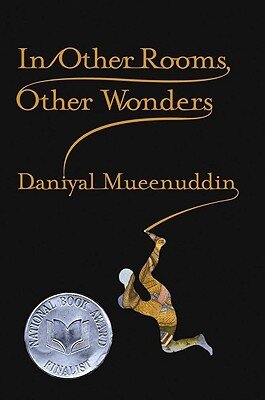In Other Rooms, Other Wonders by Daniyal Mueenuddin (Norton)
Lahore, Islamabad, Karachi, Rawalpindi - currently these cities in Pakistan have been described as strongholds of the Taliban and also as havens for terrorists. However, the short stories collected in this book take place long before the Taliban came to power. The stories are about tradition, class struggle and social change in Pakistani life. Most of the stories are set in the towns of Lahore or Islamabad. The writer himself was brought up in Lahore and currently lives on a farm in the southern Punjab region.
This is a collection of previously published short stories compiled into one book. They are drawn from a vast array of literary journals and magazines such as the New Yorker, Granta and Zoetrope: All Story. One of stories, “Nawabdin Electrician” was included in “Best American Short Stories 2008”. There are a total of eight stories starting with the previously mentioned “Nawabdin Electrician”. Also included are “Saleema”, “Provide, Provide”, “About a Burning Girl”, “In Other Rooms, Other Wonders”, “Our Lady of Paris”, “Lily”, and “A Spoiled Man”.
In “Nawabdin Electrician”, a lower class man with twelve daughters and one son is a mechanic and an electrician who works for a wealthy landowner named K.K. Harouni. Nawab takes care of the man’s seventeen tube wells located on his property. He goes from one well to another by bicycle. He talks his patron into providing him with a motorcycle to do his job more efficiently. Once Nawab is in possession of the motorcycle, it also raises his status in the eyes of his peers. However, it also leads to his near death as he is nearly robbed of his prized possession, even getting shot in the process.
In “Saleema”, we find that she works as a maid, is married, but is also sleeping with Hassan the cookSaleema and the cook, Hassan work for K.K. Harouni. She uses sex to advance her station in life and unexpectedly falls in love with one of the other servants, the driver, Rafik. Saleema gets pregnant by Rafik, although he is married as well. But the fountain of wealth, K.K. Harouni passes. As Hassan and Rafik had been in service to Harouni for a number of years, they would be sent to a different house in Islamabad. Saleema finds a job at another house, friends of Harouni, who took her in just because she worked at his house. But in the end, she loses her job, she starts taking drugs she once despised, leaves her husband, and ends up on the street begging with her son. Soon enough she dies and her son is left begging in the streets becoming what is known as “one of the sparrows of Lahore.”
Onto “Provide, Provide”, we learn about K.K. Harouni and how he was born into a rich family. As he tries to keep up appearances to compete with the new breed of Pakistani industrialist, he would sell vast amounts of land he owns and sink the money into factories; however, the more he sinks into the factories, the more they seemed to decline until his bankers advised him to close. While Harouni was spending less time at his family home in the southern area of Punjab, he left that up to his manager, one Chaudrey Nabi Baksh Jaglani who has ideas of his own.
The characters in the five remaining stories are related to the central character of K.K. Harouni as if part of one long and continuing soap opera. The stories provide us with a detailed look into the social strata of Pakistani life with the caste system derived from India, ever strong and present. Once you’ve completed the book, you find yourself wanting more. To see what has become of some of the newer characters and to see what has happened to the ones you have already become familiar with. The book provides everything you can hope for - love, romance, betrayal, loyalty, and the interrelationships between all the characters. It’s a book you won’t want to put down.
